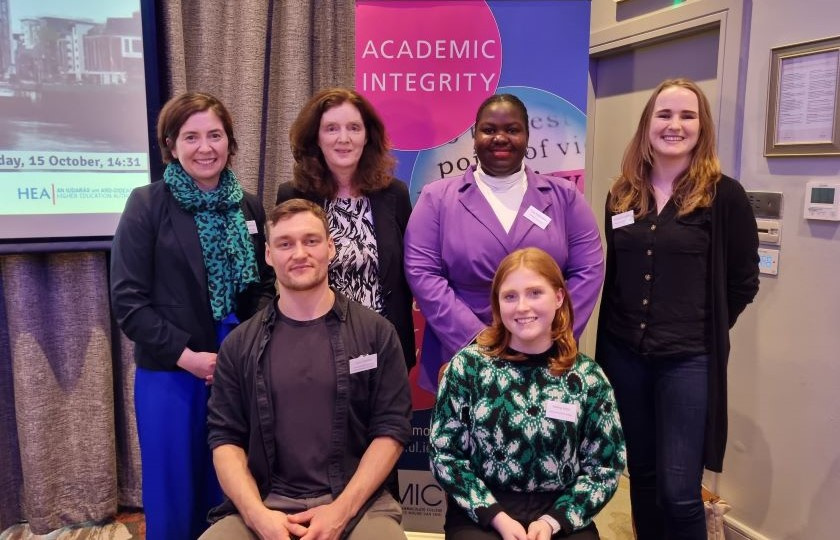
The Navigating the New Frontier: Generative AI and Academic Integrity conference was held at the Clayton Hotel, Limerick on the 14 and 15 of October 2024. This two-day event was organised by the MIC Learning Enhancement and Academic Development (LEAD) Centre, in partnership with the University of Limerick and Technological University of the Shannon, and in association with the National Academic Integrity Network (NAIN). The conference was funded by the National Forum through the Strategic Alignment of Teaching and Learning Enhancement (SATLE) fund.
This hybrid conference brought together diverse voices from the sector and explored the relationship between Generative AI and Academic Integrity within Higher Education (HE) through keynote presentations, paper presentations and a roundtable discussion. At the beginning of day one, Dr Xianghan (Christine) O’Dea, a Senior Lecturer in Management and Technology Education in the Department of Public Services Management & Organisation at King’s Business School, King’s College London, delivered her keynote address entitled "GenAI is Here to Stay. What is the Way Forward for Higher Education Globally?" Dr O’Dea discussed the impact of Generative AI on higher education, and suggested the need for the higher education sector to concentrate on areas such as providing AI literacy training and guidance for staff and students, and gaining a clear understanding of industry expectation of students’ AI/GenAI skills.
Across the two days there were five panels which consisted of 15 presentations by academics from Ireland, the UK and Canada. The speakers considered ideas and debates around Generative AI including acceptable use, equity of access, originality, risk management, designing for the classroom and assessment, and policy development and implementation. In addition, there was a roundtable discussion between staff and student representatives from the three Limerick institutions. The roundtable questioned, “in what context is Generative AI acceptable for staff and students to use in a teaching, learning, assessment and feedback context?”
At the close of day two, Dr Daniel Schiff, Assistant Professor of Technology Policy at Purdue University and Co-Director of GRAIL, the Governance and Responsible AI Lab, delivered his keynote address entitled “Dilemmas in the AI-Enabled Classroom: Navigating Pedagogy, Ethics, and Transformation in the Era of AIED." In this thought-provoking presentation, Dr Schiff provided an overview of the advances in AI over the past number of decades, reflected on the ethics and dilemmas of using Generative AI in Education, and emphasised the importance of developing skills such as critical thinking, problem solving and collaboration.
The conference was a remarkable success, attracting 272 registrations (118 in-person and 154 online). The delivery of a hybrid conference that has an equally immersive and engaging experience for in-person and online attendees was a particular challenge, but the conference organising committee strove to achieve this. The lead organisers, Dr Katherine Whitehurst (MIC) and Dr Mary-Claire Kennedy (UL), and conference manager Dr Aoife Chawke (MIC), co-ordinated the in-person elements of the conference, while Tom Kinsella successfully designed the online delivery of the conference. The MIC LEAD team (Tom Kinsella, Amy Mitchell, Niamh McNamara, Aoife Shanahan and Ciaran Lanigan) implemented and managed all technical components throughout the conference. The engagement that both online and in-person attendees had throughout the two days, and the positive feedback received, is a testament to the committee’s hard work, the successful delivery and timely nature of the conference.
We would like to thank all of those who Chaired sessions (Dr Silvia Benini (UL), Dr Nuala Harding (TUS), Dr Geraldine McDermott (TUS), Dr Jean Reale (MIC), Dr Angélica Rísquez (UL), and Dr Michael Wride (UL)) and the conference committee for all their time and effort. The engagement that both online and in-person attendees had throughout the two days, and the positive feedback received, is a testament to the committee’s hard work, and the successful delivery and timely nature of the conference.
To find out more about the conference and watch the presentation videos please click on the Generative AI and Academic Integrity Conference webpage link here.
You can also read reflections on the conference by the conference organisers on the National Forum website here.
Conference Committee
Mary Immaculate College
- Dr Patrick Buckland
- Dr Aoife Chawke
- Tom Kinsella
- Ciaran Lanigan
- Niamh McNamara
- Amy Mitchell
- Dr Jean Reale
- Aoife Shanahan
- Dr Katherine Whitehurst
University of Limerick
- Dr Silvia Benini
- Dr Mary-Claire Kennedy
- Dr Fionn McGrath
- Dr Angélica Rísquez
- Dr Michael Wride
Technological University of the Shannon
- Dr Nuala Harding
- Dr Geraldine McDermott
- Catherine O’Donoghue




